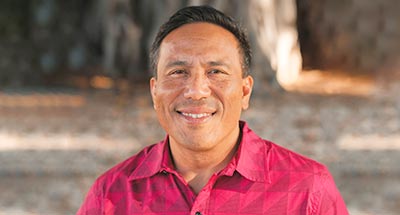
Ty P. Kāwika Tengan
Professor
Office: George Hall 308
Telephone: 1 (808) 956-5144
Email: ttengan@hawaii.edu
Browse My Publications:

Background
I entered the fields of anthropology and ethnic studies because I had many questions about the nature of Hawaiian culture and nationhood, and I felt the best way to find these answers was through ethnographic (immersive, community-based) research and engagement. Born and partly raised on Army bases outside of Hawai‘i, I have spent most of my life in Hawai‘i and claim Maui as where I'm from (though presently I live in Pālolo). I teach generally on both precolonial and contemporary Hawaiian society, especially as it has been and continues to be transformed by Native Pacific and US imperial histories. I strive to empower students to ask bigger and better questions than I have.
Education
- PhD, Anthropology, University of Hawaiʻi at Mānoa, 2003
- MA, Anthropology, University of Hawaiʻi at Mānoa, 2000
- Certificate, International Cultural Studies Program, University of Hawaiʻi at Mānoa and East-West Center, 2000
- BA, Anthropology modified with Native American Studies with Honors, Dartmouth College, Hanover, 1997
Research
I have conducted research on Hawaiian masculinities, sovereignty, land, militarism, identity, museums, heritage, football, and Native Pacific culture and politics. A secondary project has been to rethink the academic disciplines I have most engaged with: anthropology, ethnic studies, and Indigenous studies. I am presently conducting research on the experiences of Native Hawaiian veterans. I have run two separate community based oral history field schools on the North Shore of O‘ahu–one in Waialua (2017-2021) in collaboration with Kamehameha Schools and the Waialua Hawaiian Civic Club, and another in Waiale‘e (2023) with the North Shore Community Land Trust and other units at UHM, including our Center for Oral History.
Community Engagement
I have been very committed to working with our kāne (Hawaiian men) through the Hale Mua o Kūali‘i organization and through the ‘Aha Kāne foundation. This work has involved doing cultural workshops and giving talks in different communities. I have also worked with Hale Mua and ‘Aha Kāne to hold Makahiki ceremonies that allow for cultural and spiritual practices celebrating Lono and the fertility of the land. As a scholar committed to Hawaiian rights, I have served as a cultural expert on cases dealing with water rights on Maui, burial sites protection on O‘ahu and Hawai‘i, and the protection of religious freedoms of Hawaiian prisoners on O‘ahu and in Arizona.
